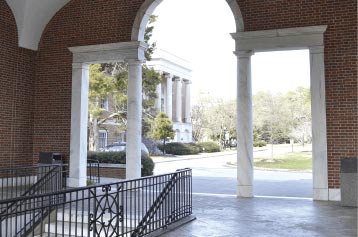2023-2024 Catalogue
Environmental Science (ESC) Course Descriptions
ESC 150: Principles of Environmental Science.
Goal: To appreciate that the Earth and its living systems sustain humankind, and to understand how the agricultural and industrial activities of human societies modify biogeochemical cycles and transform natural ecosystems, often to the detriment of ourselves and other species.
Content: An introduction to environmental sciences, an interdisciplinary field integrating concepts from ecology, chemistry, politics, and economics. The focus is on interactions between people and the environment, with specific topics including: human population growth; fuels and energy; pollution of air, water and soil; human alterations to global biogeochemistry, including global warming and acid rain; and responses of human societies to environmental issues. Laboratory exercises will take place in the lab and in the field. Lab fee.
Gen. Ed. Category: Exploring; Natural World; (SM).
Credit: 4 hours.
ESC 208: Field Biology.
Goal: To practice field techniques and quantitative skills commonly used in outdoor scientific disciplines. To learn to identify the conspicuous plant and animal species of Georgia and consider how they are adapted to their environments.
Content: Students will be introduced to the flora, fauna, and ecosystems of the southeastern United States in this field-intensive course. Emphasis will be on practical aspects of conducting scientific investigation outdoors, namely: taxonomic skills, field identification of plants and animals, use of dichotomous keys, techniques for sampling and describing natural populations and communities, and quantitative skills for analysis of data. Lab fee.
Prerequisites: BIO 110 and BIO 112; or ESC 150.
Credit: 4 hours; cross-listed as BIO 208.
ESC 260: Interpretations of Land and Nature.
Goal: The course is an interdisciplinary seminar with the goals of stimulating thought around global environmental issues, while asking students to synthesize different ways of knowing and understanding the world around them. In particular, the course considers different ways of thinking around land and nature. The class will reinforce writing, speaking, and critical thinking skills and culminate in a collaborative Design Thinking project in which students solve real-word problems.
Content: The course takes an interdisciplinary approach to understanding the theory, history, and reality of natural spaces. Students will read philosophy and poetry, and explore basic ideas of land ownership, stewardship, exploitation, conservation, and sustainable use. Students will evaluate the idea of the ‘commons’ and the purposes of the sequestration of land into public parks. The course examines current environmental degradation crises and contemporary solutions, and involves students in a culminating Design Thinking project.
Prerequisite: None.
Gen. Ed. Category: Synthesizing Perspectives; Diverse and Interdependent World; (SBS).
Credit: 3 hours; cross-listed as POL 260.
ESC 280: Ecology.
Goal: To understand the interrelationships between living organisms and their physical and biological environment. To develop a broad understanding of the field of ecology. To conduct ecological research.
Content: Ecological principles at the level of the individual, population, community, and ecosystem. Specific topics include nutrient cycles, flow of energy in ecosystems, population dynamics, evolutionary ecology, life histories, competition and other community interactions, succession, and island biogeography. Current topics in anthropogenic global change. Lab fee.
Prerequisites: BIO 110 and 112; or ESC 150.
Credit: 4 hours; cross-listed as BIO 280.
ESC 360: Conservation Biology.
Goal: To understand the reasons why many species are endangered, to examine possible solutions, and to consider the ethical and ecological ramifications of species extinctions. To appreciate the interdisciplinary nature of conservation biology by considering issues ranging from the level of the gene to the scale of the entire biosphere.
Content: Students read, review, and discuss current literature in this speaking-intensive course. Students will conduct both laboratory- and field-based studies. Topics include defining diversity, threats to biodiversity, population genetics of rare species, conservation strategies and nature preserves, and legal and ethical issues. Lab fee.
Prerequisites: BIO 110 and 112; or ESC 150.
Credit: 4 hours; cross-listed as BIO 360.
ESC 396: Special Topics in Environmental Studies.
Goal: To provide an opportunity to explore topics outside those offered elsewhere within the environmental studies curriculum or to explore in greater detail a subject covered by another course.
Content: An in-depth examination of a special topic within environmental studies. Topics will vary from semester to semester.
Taught: Offered occasionally.
Prerequisites: ESC 150 or permission of the instructor.
Credit: 3, 4 hours. A student may take a maximum of six to eight semester hours (two courses) of special topics in any one field.
ESC 440: Senior Integrative Exercise in the Life Sciences.
Goal: To provide a capstone integrative experience for seniors majoring in biology, neuroscience, and environmental studies. To prepare for careers and professional growth by discussing future goals and reflecting on past collegiate experiences, both in the major and in the general education curriculum.
Content: With faculty guidance, students will work individually to research a focused topic integrating concepts of biology, neuroscience, or environmental studies with those of another academic discipline. Students will work collaboratively in a small group to organize oral presentations incorporating individual topics into a broader theme, question, or problem. Students will make their presentations at the end of the semester to students and faculty in the Division of Natural Sciences and Mathematics. Students will also critique resumes and prepare cover letters for a variety of postgraduate opportunities.
Prerequisites: Declared major in Biology with senior standing and completion of BIO 110, BIO 112, and BIO 203; or declared major in Environmental Studies with senior standing and completion of ESC 150 and at least one 200- or 300-level ESC class; or declared major in Neuroscience with senior standing and completion of NSC 207, NSC 325, or NSC 335; or consent of instructor.
Credit: 3 hours; cross-listed as BIO 440 and NSC 440.
ESC 451: Directed Independent Study.
Goal: To enable an intensive exploration of a topic of special interest. To promote original, independent, creative, and critical thinking from an environmental perspective. To solve real problems in a scientific manner. To provide an opportunity to conduct independent laboratory work and to learn new techniques.
Content: Directed independent work of a critical or analytical nature. Under careful faculty supervision, qualified student are encouraged to develop originality of thought and thoroughness of method. Some emphasis is placed on research methods.
Prerequisites: Permission of the program director.
Credit: 1-6 hours.
ESC 452: Field Study.
Goal: To afford actual experience in an environmental laboratory, consulting, or advising capacity.
Content: Applied areas in environmental science may be considered for internship credit. The student must submit a brief plan including objectives, anticipated activities, a list of readings, and the nature of the reports to be submitted to the sponsor.
Prerequisites: Permission of advisor, program director, faculty sponsor, and the Director of Career Development.
Credit: 1-12 hours.
ESC 499: Honors Thesis. (Fee required).



